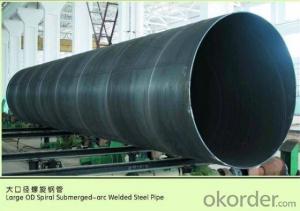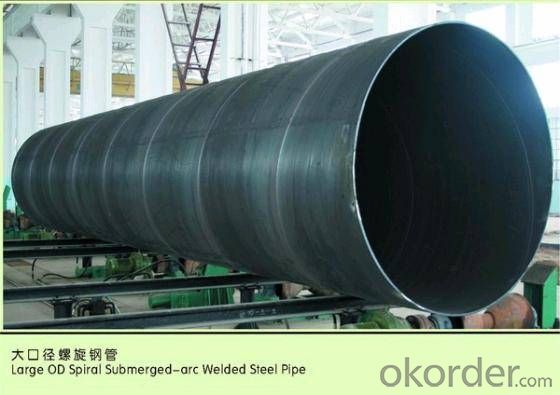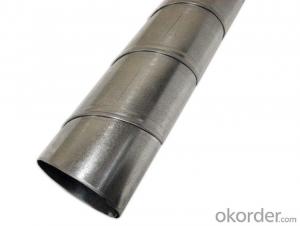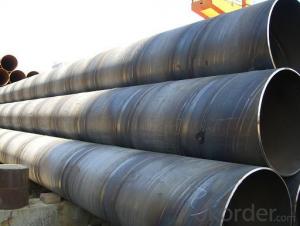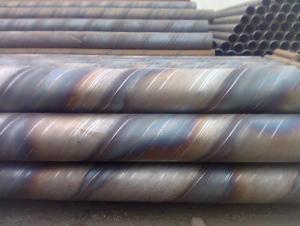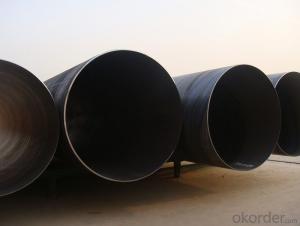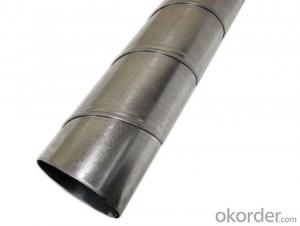SPIRAL WELDED STEEL PIPE 32‘’ 48‘’CARBON
- Loading Port:
- Tianjin
- Payment Terms:
- TT OR LC
- Min Order Qty:
- 5 m.t
- Supply Capability:
- 3000 m.t/month
OKorder Service Pledge
OKorder Financial Service
You Might Also Like
Packaging & Delivery
Packaging Detail: | standard export packing or as customer's requirement |
Delivery Detail: | within 10 - 30 days |
Specifications
Spiral Welded Steel Pipes and Tubes
1.Material:Q195-Q235
2.Length:1-12m
3.WT:1.0-14mm
4.O.D.:20-273mm
Spiral Welded Steel Pipes and Tubes
Product Description:
1.Material : Q235,Q345,L245,L290,L360,L415,L450,L485,GrB,X42,46,X52,X56,X60,X65,X70,X80,X100
2,Standard: SY/T5037-2000,GB/T9711-2011,API Spec 5L PSL1/PSL2,ASTM A252\A53,ISO3183,DIN17172,EN10217,JIS G3457,AWWA C200,ASTM A139,ASTM A671,ASTM A672
3.Wall thickness: 3.0mm-30mm
4.Outer diameter: φ168mm-3020mm
5,Length: 5m-12m or as your requirement
6,Corrosion protection standard: DIN30670,DIN30671, AWWAC210, AWWA C203, SY/T0413-2002,SY/T0414-2002
7,Application: Oil, gas, natural gas, water pipe, thermal electricity pipe, steel structure engineering, etc
Q195-q345 Material Steel Pipe's Materials
Elements | Chemical Compsition% | Mechanical Property | ||||||
C% | Mn% | S% | P% | Si% | Yield Point (Mpa) | Tensile Strength(Mpa) | Elongation | |
Q195 | 0.06-0.12 | 0.25-0.50 | <0.050< span=""> | <0.045< span=""> | <0.030< span=""> | >195 | 315-430 | 32-33 |
Q215 | 0.09-0.15 | 0.25-0.55 | <0.05< span=""> | <0.045< span=""> | <0.030< span=""> | >215 | 335-450 | 26-31 |
Q235 | 0.12-0.20 | 0.30-0.70 | <0.045< span=""> | <0.045< span=""> | <0.030< span=""> | >235 | 375-500 | 24-26 |
Q345 | <0.20< span=""> | 1.0-1.6 | <0.040< span=""> | <0.040< span=""> | <0.55< span=""> | >345 | 470-630 | 21-22 |
Packaging & Delivery
Packaging Detail: | Normal exporting packing,in container or bulk vessel or as per clients' request |
Delivery Detail: | 2 months after confimed contract |
Specifications
Large Diameter API 5L X70 PSL2 LSAW Steel Pipe
Grade: X42, X46, X50, X52, X60, B, C
OD: 1.5"-28"
WT: SCH10-SCH160
Brand:TPCO
Large Diameter API 5L X70 PSL2 LSAW Steel Pipe
Specifications:
u Standard: API 5L
u Grade: B, C, X42, X46, X50, X52, X56, X60, X65, X70, X80
u OD: 1.5"-28"
u WT: SCH10-SCH160
u Length: 5-12m
u Ends Finish: plain end, bevel end, grooved end
u Surface Treatment: bare, black varnished, oiled finish, red color, anti-corrosion, 3PE, FBE or epoxy coating
u Technique: hot rolled or cold drawn
u Application: api 5l steel pipe for conveying oil, water, gas
u Invoicing: based on theoretical weight or actual weight
u Payment Terms: L/C at sight, T/T or Western Union
u Trade Terms: FOB, CFR, CIF
u Certification: ABS manufacturing assessment, ABS design assessment, API 5CT, API 5L, DNV manufacturer certificate, ISO9001 quality management system certificate, ISO14001 environment management system certificate, GB/T28001 occupational health and safety management system certificate, A1 class manufacturing license of special equipment certificate, CCS, GL, LR, SGS, TüV, PDE
- Q: How do you calculate the pipe thermal expansion for steel pipes?
- To calculate the thermal expansion of steel pipes, you can use the formula: ΔL = α * L * ΔT, where ΔL represents the change in length, α is the coefficient of thermal expansion for steel, L is the original length of the pipe, and ΔT is the change in temperature.
- Q: How do steel pipes perform in high-altitude applications?
- Steel pipes perform well in high-altitude applications due to their strength, durability, and resistance to extreme weather conditions. They can withstand the low temperatures and high winds typically found at high altitudes, making them a reliable choice for various industries such as oil and gas, construction, and infrastructure development. Additionally, steel pipes have the ability to maintain their structural integrity under high pressure, making them suitable for transporting fluids and gases at high altitudes.
- Q: How are steel pipes used in the construction of stormwater drainage systems?
- Steel pipes are commonly used in the construction of stormwater drainage systems due to their durability and strength. These pipes are used to convey stormwater from various sources, such as streets and rooftops, to designated discharge points, preventing flooding and directing the water away from structures. Steel pipes are ideal for handling the high flow rates and heavy loads associated with stormwater runoff, making them an essential component in the construction of efficient and reliable drainage systems.
- Q: How are steel pipes cleaned and maintained?
- Steel pipes are cleaned and maintained through various methods. The process typically involves removing any debris or rust from the pipes using wire brushes or sandblasting. After cleaning, a protective coating is applied to prevent corrosion. Regular inspections and maintenance checks are also conducted to identify any potential issues such as leaks or weak points, ensuring the pipes remain in optimal condition.
- Q: What are the different joining methods for steel pipes?
- The different joining methods for steel pipes include welding, threaded connections, flanges, and grooved connections.
- Q: How are steel pipes used in the chemical industry?
- Steel pipes are commonly used in the chemical industry for various applications including the transportation of corrosive chemicals, as well as for transferring fluids and gases at high temperatures and pressures. These pipes are durable, resistant to corrosion, and can withstand harsh working conditions, making them ideal for handling chemicals in industrial settings.
- Q: What place must use galvanized steel pipe to make lighting line?
- Galvanized pipe for pipeline laying construction and transformation of lighting, power, telephone, fire protection system in the engineering (made of galvanized steel), for laying, laying can be laid in the dark, the wall can also be installed on the ceiling.
- Q: What are the different types of coatings used for internal lining of steel pipes?
- There are several types of coatings commonly used for the internal lining of steel pipes, including epoxy coatings, polyurethane coatings, cement mortar linings, and polyethylene linings. Each type of coating offers different benefits and is chosen based on factors such as the intended application, corrosion resistance requirements, and cost-effectiveness.
- Q: What are the safety precautions when working with steel pipes?
- When working with steel pipes, it is important to follow safety precautions to minimize the risk of accidents and injuries. Some key safety measures include wearing appropriate personal protective equipment (PPE) such as gloves, safety glasses, and steel-toed boots to protect against cuts, burns, and falling objects. It is crucial to use proper lifting techniques or equipment when handling heavy steel pipes to avoid strains or back injuries. Additionally, workers should be cautious of potential hazards such as sharp edges, welding sparks, or exposure to hazardous materials. Regular inspection and maintenance of equipment and tools is necessary to ensure their safe operation. Proper training, awareness of surroundings, and adherence to safety protocols are essential for a secure working environment when dealing with steel pipes.
- Q: How are steel pipes used in the construction of biomass power plants?
- Steel pipes are used in biomass power plants for various applications such as transporting biomass fuel, carrying water for steam generation, and distributing hot water or steam throughout the plant. They provide a sturdy and reliable infrastructure for the efficient functioning of the plant, ensuring the safe and effective operation of the biomass power generation process.
Send your message to us
SPIRAL WELDED STEEL PIPE 32‘’ 48‘’CARBON
- Loading Port:
- Tianjin
- Payment Terms:
- TT OR LC
- Min Order Qty:
- 5 m.t
- Supply Capability:
- 3000 m.t/month
OKorder Service Pledge
OKorder Financial Service
Similar products
Hot products
Hot Searches
Related keywords
